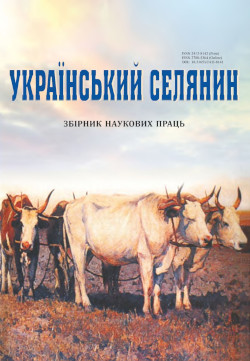Друга світова війна у повоєнній долі її учасників і сучасників (на прикладі працівників аграрної сфери)
##plugins.themes.bootstrap3.article.main##
Анотація
Анотація. Мета дослідження — на прикладі працівників аграрної сфери дослідити впливи війни та перебування
у німецькій неволі на їхнє подальше виробниче життя та подальшу долю.
Наукова новизна. Показано, що при висуненні на керівні та управлінські посади будь-якого рівня в управлінській
чи матеріальній сфері обов’язковим було враховування біографії особи та її найближчих родичів. Виявлено, що це
було головним аргументом для зняття з керівної посади або не призначення на неї. Розкрито позицію правоохоронних
органів щодо таких осіб. З’ясовано, що зазначений факт їхньої біографії інституцією розглядався додатковим
чинником для здійснення ними кримінальних дій. Досліджено позицію щодо такої категорії працівників партійних
структур республіки обласного і районного рівнів та міністерств сільського господарства України і СРСР. Доведено
її ідентичність. Виявлено, що: 1) на місцевому рівні існувала така особливість, як переплетення державної політики зі
зведенням особистих рахунків; 2) у середині 1950-х рр. дії місцевих партійних керівників набули таких масштабів, що
негативно позначалися на ініційованому М. Хрущовим курсі зміцнення кадрів голів колгоспів спеціалістами сільського
господарства республіки.
Досліджено ситуацію і у сферах, пов’язаних із підготовкою кадрів для села як у викладацьких, так і у студентських
колективах. Відповідні органи виявляли таких людей і заклад позбувався їх. Розглянуто обставини набуття освіти
сільськими дітьми. Показано, що через значні втрати чоловічого населення села, значні маси сімей були неповними
і багато дітей змушені були полишати навчання та йти працювати. Підкреслено, що в основній своїй масі сільська
молодь повоєнного часу залишилася малоосвіченою. Розкрито, що більшість тих, чиї дитинство та юність припали
на період війни, не змогли реалізувати свій освітній потенціал і змушені були обмежитися сферою фізичної праці.
Висновки. Війна і після її закінчення не переставала впливати на долю тих, хто вимушено перебував на
окупованій території чи був насильно вивезений на примусові роботи. Навіть у такій сфері, як сільське господарство
з боку державних, господарських, силових та партійних структур мало місце упереджене ставлення щодо людей,
які з вини влади опинилися в німецькій окупації, полоні, на примусових роботах. Воно проявлялося у їх творчій,
професійній, морально-психологічній дискримінації, політичному переслідуванні. Влада всіляко обмежувала
можливості для набуття ними освіти, професійного зростання. На селі, експлуатуючи його економічний і людський
потенціал, обмежила можливості основної маси цілого покоління сільських дітей в набутті ними належної освіти, на
десятиліття законсервувавши низький освітній рівень села, звівши їх вибір лише до кола робітничих спеціальностей
у колгоспному виробництві та на промислових підприємствах міст.
##plugins.themes.bootstrap3.article.details##

Ця робота ліцензується відповідно до Creative Commons Attribution 4.0 International License.
Посилання
Andreev, A. (2013). Metody i formy ideolohichnoi ta ahitatsiino-propahandystskoi diialnosti radianskykh
orhaniv repatriatsii «peremishchenykh osib» na terytorii Ukrainy u 1945 rotsi. [Methods and forms of ideological
and agitational-propaganda activities of the Soviet bodies of repatriation of «displaced persons» on the territory of
Ukraine in 1945. Gileya. [Gileyа]. 20. 72. 147–154. [in Ukrainian].
Butsko, V. (2005). Stvorennia i diialnist radianskykh orhaniv repatriatsii 1944‒1946. [Creation and
activities of Soviet repatriation bodies 1944–1946. Storinky voiennoi istorii Ukrain. [Pages of the military history
of Ukraine], 9, 3. 206–212. [in Ukrainian].
Niemiets, R. & Yatsenko, N. (1999). K voprosu ob ystoryy uhona v Hermanyiu 1941–1943 hh. [To the
question about the history of kidnapping in Germany in 1941–1943. Spadshchyna. [Heritage]. Dnipro: Art-Pres.
[in Ukrainian].
Osobystyi arkhiv avtora. [Personal archive of the author. Spohady [Memoirs]. Dovban: Lidii Andriivny.
[in Ukrainian].
Osobystyi arkhiv avtora. [Personal archive of the author]. Spohady [Memoirs]. Bozhenko Dominiky
Yelysiivny. [in Ukrainian].
Pastushenko, T. (2005). Repatriatsiia ukrainskykh «ostarbaiteriv» na batkivshchynu: 1944–1947 rr.
[Repatriation of Ukrainian «Ostarbeiters» to their homeland: 1944–1947]. Storinky voiennoi istorii Ukrainy.
[Pages of the military history of Ukraine], 9 (3), 123–136. [in Ukrainian].
Rosiiskyi derzhavnyi arkhiv ekonomiky.
Tkachenko, V. (1999).Stanovyshche ostarbaiteriv v Nimechchyni. [The situation of Ostarbeiters in
Germany]. Spadshchyna. [Legacy]. Dnipro: Art-Pres. [in Ukrainian].
Tsentralnyi derzhavnyi arkhiv vyshchykh orhaniv vlady i upravlinnia Ukrainy.
Yankovska, O. (2005). Do pytannia pro doliu ukrainskykh repatriantiv Velykoi vitchyznianoi viiny. [On
the question of the fate of Ukrainian repatriates of the Great Patriotic War]. Storinky voiennoi istorii Ukrainy.
[Pages of the military history of Ukraine], 9 (3), 319–324. [in Ukrainian].

